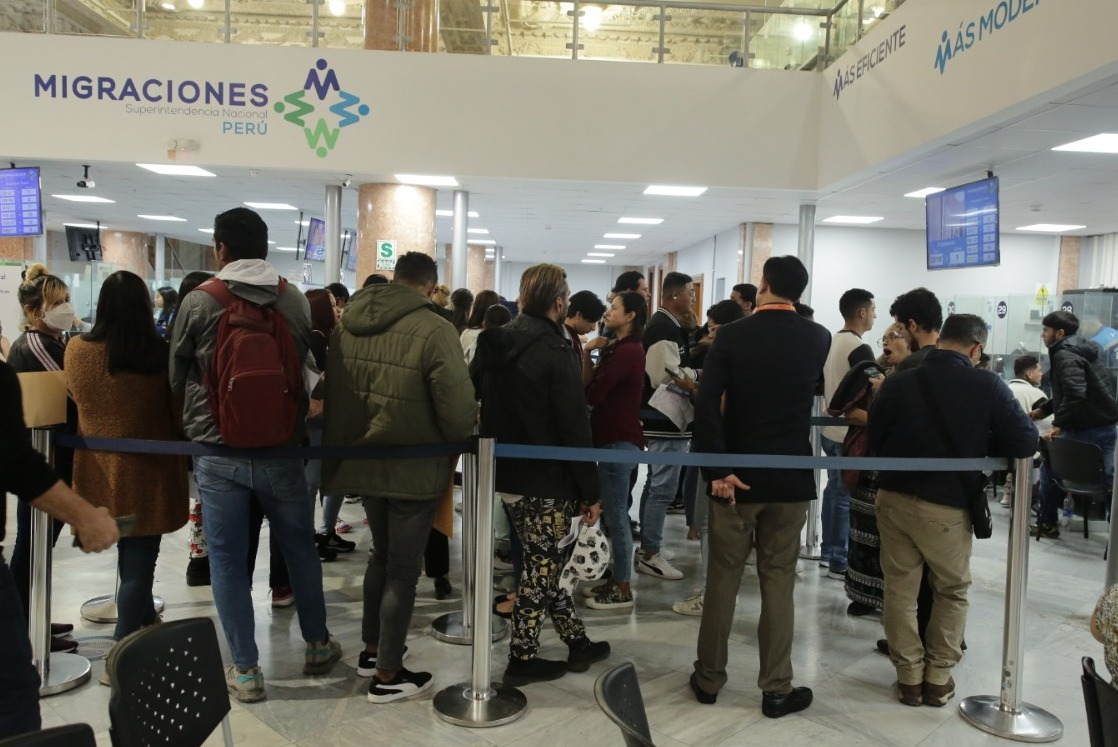
The start of an indefinite strike by immigration inspectors at all airports in the country would mean a loss of more than S/10 million per day and an imminent risk to flights for the National Holidays on July 28 and 29, estimated the National Union of Workers CAS of the National Immigration Superintendence.
Immigration control workers began an indefinite strike on Wednesday, July 24, demanding to be included in the labor regime of DL No. 728, the Law on Productivity and Labor Competitiveness, in addition to compliance with the 2023 and 2024 agreements signed with the Ministry of Economy and Finance (MEF).
Yasser Boluarte, general secretary of CAS Migration workers, explained to The Republic that the list of demands also includes the delivery of a food card for S/4, tickets, clothing and better conditions in the modules where they work.
“Before signing the agreement, the Budget area had already verified the capacity of the MEF. The superintendent [Armando García] “They have not spoken to us and there is no initiative from the State to talk. We are taking forceful measures because we have been receiving truncated salaries for years and we have no benefits,” said Boluarte.
Migrations has 1,200 employees, of which 700 are affiliated. They manage a total of 24 border controls, including those in Lima, Tumbes, Tacna, Cusco and Piura. The workers complain that they do not receive more than S/20 in travel expenses at the border in some cases, while the high officials of the institution receive S/300, which is why they consider that “it is not that there is no money, but that the budget is poorly managed.”
“We are talking about a loss of S/10 million a day due to tourism and lost flights by passengers from the country, as well as a bottleneck in the terminals. At the Jorge Chávez Airport, for example, there are 270 inspectors working. Imagine that there will be no more than 10 left? They will not be supplied, no one will be able to enter or leave Peru. Flights would be lost, both incoming and outgoing,” the leader stressed.
According to the Union, salaries range between S/1,000 and S/5,000, but the “bulk of immigration inspectors” earn no more than S/2,600. For this reason, they are also negotiating the delivery of bonuses in 2024 to compensate somewhat for the drop in their real income.
“They would not be able to enter Peru. We are the ones who grant access to both foreigners and Peruvians. But people who are already in the territory would also have problems leaving. The police do not do our job, even though we work with the PNP. We are the ones who make people with warrants or who do not fit the profile available to them,” he stressed.
Migration strike: pilots will not be able to leave the country either
Immigration controllers at Jorge Chávez Airport handle, per 12-hour shift, an average of 5,000 people, which can reach 10,000 per day and up to 15,000 on peak dates – such as Fiestas Patrias on July 28 and 29 – between arrivals and departures.
However, the Union also warns that pilots who go through immigration control, as well as flight attendants, regardless of their nationality, would be at a disadvantage.In practice, pilots coming from abroad will not be able to enter, and those who are already in Peru will not be able to return to their country.
In addition, the drug trafficking and smuggling control system is completely weakened.a situation that CAS workers from Migrations do not rule out being exploited as a window of impunity at airports.
“We know that in Tumbes, immigration control is evaded because sometimes even the police themselves turn a blind eye and ignore the traffickers. And the inspector cannot be replaced by an administrative officer, he goes through an instruction process,” Yasser Boluarte said.
Source: Larepublica
Alia is a professional author and journalist, working at 247 news agency. She writes on various topics from economy news to general interest pieces, providing readers with relevant and informative content. With years of experience, she brings a unique perspective and in-depth analysis to her work.












